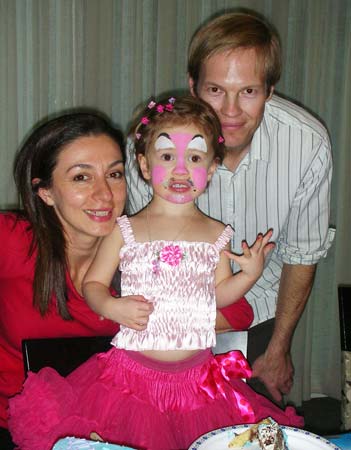Blocking Angiogenesis and Gamma Knife Surgery
Neurosurgeon Gelareh Zadeh’s focus is on neuro-oncology,
both in her clinical and research work. Working
together as a team with Fred Gentili at Toronto Western
Hospital, she continues to build her skull base practice
through Fred’s excellent mentorship and collaboration.
Endoscopic neurosurgery was historically focused in the
region of the sella turcica. However, the transnasal endoscopic
approach now includes a much wider range of
operations. Anterior and middle skull base pathologies
can now be accessed through the expanded endonasal
approach.
Gelareh works with Mount Sinai Head & Neck surgeon
Allen Vascan in the operating room at Toronto
Western Hospital where they are building a skull base
program. Gelareh’s second clinical focus in neuro-oncology
is the treatment of brain metastases. She runs a brain
metastases clinic with Mark Bernstein and the radiation
oncologists at Princess Margaret Hospital. “The treatment
of this challenging patient population is evolving
rapidly as systemic therapy improves overall survival and
alters tumor biology. In the past, brain metastases were
treated with whole brain radiotherapy, but stereotactic
radiosurgery enables us to tailor individual treatments
that improve overall quality of life and prolong functional
independent status.” There are two gamma knife
machines, one at Princess Margaret, used for malignant
lesions and one at Toronto Western used for other brain
pathologies.
Gelareh was born in Iran, raised in England and came
to Canada at age 17. As she and her family arrived in
Winnipeg on Boxing Day, her mother, a nuclear chemist
was intended to work in the nuclear industry in
Manitoba. The family stayed in Winnipeg for 10 years,
where Gelareh attended medical school and began her
neurosurgery residency. She came to the University of
Toronto to pursue a PhD with Ab Guha. Her PhD
focused on molecular pathways that regulate tumor
angiogenesis. “It was a great 4-5 years of scholarly work
at the Hospital for Sick Children. Ab Guha has been an
excellent supervisor and mentor for me.” Following her
laboratory work, Gelareh continued her neurosurgery
residency education at the University of Toronto for
the next three years. She was very busy clinically and
is grateful to her many mentors, particularly to Chris
Wallace for his remarkable mentoring in operating room
technique. She performed over 500 operations during
her senior year before the current work hour restrictions
were in place.
Her PhD work was focused on blocking angiogenesis
in a xenograft glioblastoma multiforme model. Vascular
endothelial growth factor is the main network builder
of angiogenesis. Angiopoietin then matures the basic
vascular infrastructure in order to develop the finer
vascular radicals. This step requires destabilizing preformed
vessels to allow new branching. This process is
active in embryogenesis and is recapitulated in tumors.
She worked on a competitive inhibitor injected intratumourly
to block the Tie-2 receptor. The tyrosine - kinase
inhibitor that she developed was a unique contribution.
Gelareh worked with Andras Nagy of the Lunenfeld
Institute during her angiogenesis research. She finished
her laboratory and clinical training in 2006, then went
to London, England to the Grey Institute to study
radiobiology. It was a stimulating year featuring training
in clinical trials of radiotherapy. She also set up a
brain metastases clinic there, and got unwanted media
attention when she performed the first same day outpatient
brain surgery in the UK, a technique that she had
learned from its originator Mark Bernstein.
|

Gelareh Zadeh with her husband Randall Strank and their daughter Ayla In order to develop stereotactic neurosurgery, Gelareh
turned to the Samantha Dickson Brain Tumor Trust
for financial support. The Trust provided five million
pounds to advance brain tumor research and clinical
program development. Matched funds were provided by
the National Hospital Foundation to make possible the
clinical program in brain tumor care. Professors Fish and
Hanna at University College London were instrumental
in helping Gelareh secure these funds.
“I missed the academic environment of Toronto
Western Hospital and so I returned to work with my
clinical and laboratory colleagues. Working in an established
environment that supports and fosters research,
and collaboration with likeminded clinician scientists
is even more important than the funding for research.”
Gelareh has a CIHR Surgeon Scientist Award, which is a
competitive clinician scientist award offered to approximately
ten people throughout the country every year.
She learned to value Canadian healthcare while she was
in London and saw how two tiers healthcare hurts the
public sector, as there is an inevitable drift of practitioners
toward private care. She returned in 2008 and has
been in her present position for the past three years. The
laboratory is going well and her clinical work is very satisfying.
Ab Guha and James Rutka have continued their
support and mentorship, helping her establish herself as
an independent researcher. She has also had an outstanding
scientific mentorship and collaboration with Richard
Hill, PhD at Princess Margaret Hospital.
Gelareh and Randall Strank have a three year old daughter
Ayla. Her mother Fariba has recently retired from
nuclear medicine at Health Sciences in Winnipeg to help
look after Ayla. The family lives in High Park. Both parents
and Ayla are learning the piano together, with Ayla
slightly ahead of her mother and father.
M.M.
|